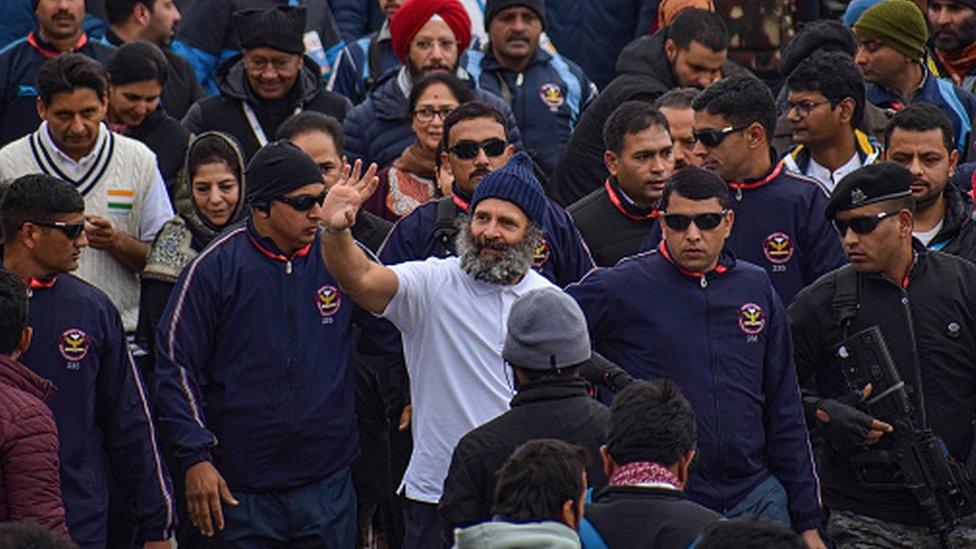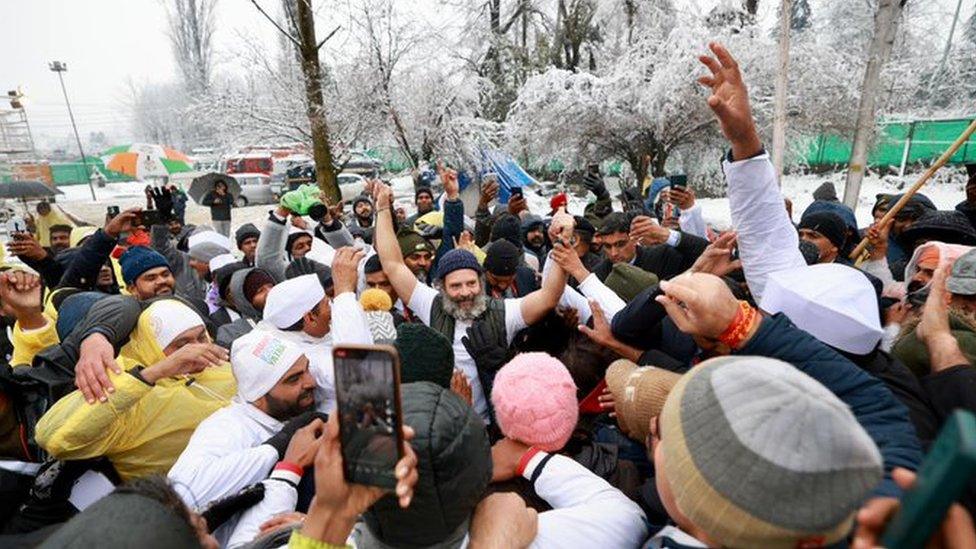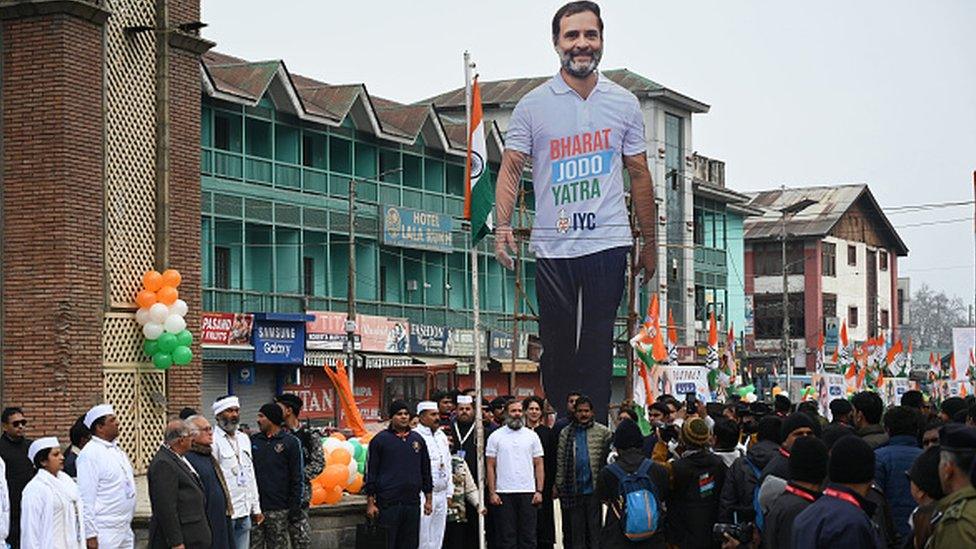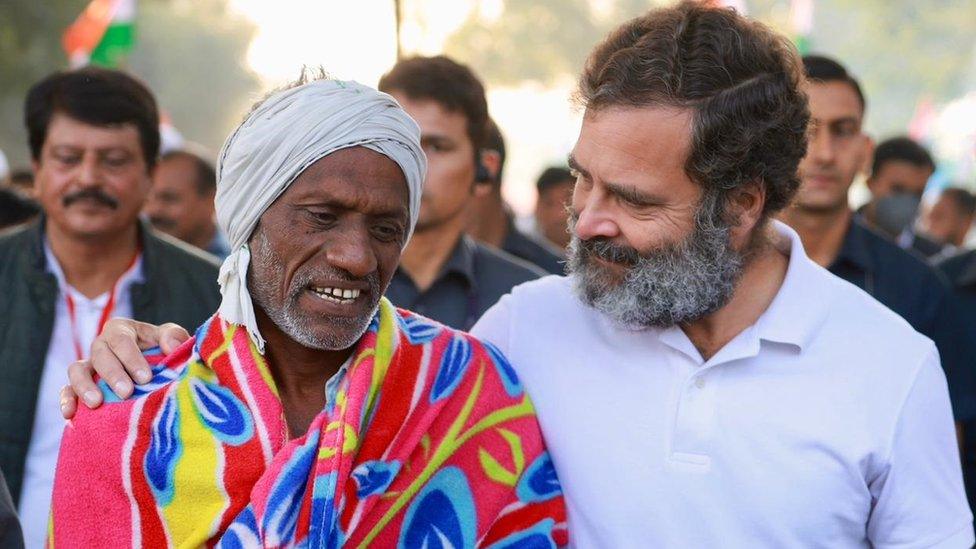Bharat Jodo Yatra: Rahul Gandhi's unity march ends in Kashmir
- Published

Rahul Gandhi has been marching across India for the past five months
Rahul Gandhi, MP and a senior leader of India's main opposition Congress party, is at the end of his 4,000km (2,485-mile)-long "unity march" across India.
The five-month-long march began in Kanyakumari in the southern state of Tamil Nadu, and finished in Srinagar, the capital of Jammu and Kashmir.
The march has drawn large crowds across the country, with a number of celebrities endorsing it.
Analysts, however, say it is unclear if this will translate into votes.
Mr Gandhi said the march - called Bharat Jodo Yatra - was aimed at uniting Indians against hatred and fear being spread in society.
Political analysts say it was also aimed at reviving the flagging spirits of the beleaguered Congress party which has been in free fall since 2014, when Prime Minister Narendra Modi swept to power in India.
The march culminated with a rally in a stadium in Srinagar on Monday afternoon. It was attended by Mr Gandhi and several other Congress leaders and also leaders from some opposition parties who joined in a show of unity.

Mr Gandhi's Bharat Jodo yatra culminated in Srinagar on 30 January
Addressing the rally, Mr Gandhi said he was warned against travelling on foot by the local administration who said a grenade could be hurled at him.
The Congress leader said he insisted on walking because "my family and [Mahatma] Gandhi taught me to live fearlessly, otherwise, that is not living".
Mr Gandhi said he had received "wholehearted love" in the region where he spent the last leg of his march.
On Sunday, the Congress MP told a press conference in Srinagar that he had received a "great response" across the country.
"The yatra's purpose is also that people of this country get to hear true voice of the country," he said.
"We saw the resilience and strength of the people of India during this journey. We also got to hear about the issues being faced by farmers and unemployed youth in the country," he added.
In November 2022, Mr Gandhi told the BBC's Nikhil Inamdar that he was trying to "seed an alternate vision for the idea of India through this march".
"With more work, this has the capacity to decimate the ruling Bharatiya Janata Party (BJP)," he said.
Since then, however, Mr Gandhi and Congress spokesperson Jairam Ramesh have said that the march should not be linked with electoral politics.

Opposition parties say it is still unclear what the march means for Congress' fight against the ruling BJP in the 2024 national elections
In Rajasthan, Mr Ramesh recently told reporters that the Bharat Jodo Yatra was not a march to win elections.
Sociologist Shiv Vishwanathan told BBC Hindi's Iqbal Ahmed that Mr Gandhi's own ideas of what the march could be transformed with time - beginning initially with targeting the BJP but then moving onto realising the need for a new kind of politics.
Mr Vishwanathan said the march was made unique by the participation of non-political people.
"I do not think that Rahul Gandhi is the hero of this journey," he told BBC Hindi. "The heroes of the yatra are the Indians who joined it and told Rahul Gandhi that today's party politics is hollow."
Apart from ordinary citizens and party workers, the march was joined by actors such as Urmila Matondkar, Swara Bhaskar, Pooja Bhatt, Riya Sen, activists Anand Patwardhan, Aruna Roy, Radhika Vemula, musician TM Krishna, comedian Kunal Kamra and former Reserve Bank of India governor Raghuram Rajan.
There has been some speculation that the march puts the Congress at the front and centre of a combined opposition front for next year's general elections.
But opposition parties told BBC Hindi that it is still unclear what the march means for the Congress and its fight against the ruling BJP.
A lot will depend on how the Congress performs in state elections - such as Karnataka, Rajasthan, Madhya Pradesh and Chhattisgarh - later in the year where the Congress is in a direct contest with the BJP.
"Rahul Gandhi has proved that he should be taken more seriously, but I don't think he can be called the face of the opposition yet," senior journalist Smita Gupta told BBC Hindi.
Mr Vishwanathan cautioned against the Congress party's history of falling short of people's expectations and the danger of it reverting to its old ways.
"If Rahul Gandhi wants to do politics with civil society, then he will have to reform the Congress into a new political party of the future. But it will take a miracle."

Read more India stories from the BBC:

Related topics
- Published7 September 2022
- Published25 November 2022
